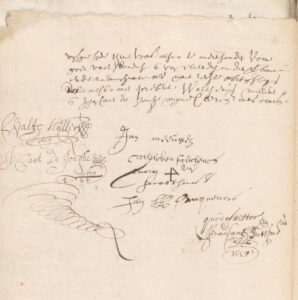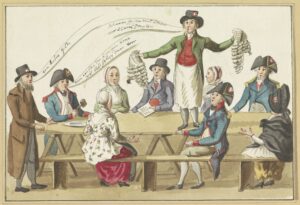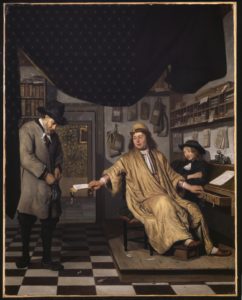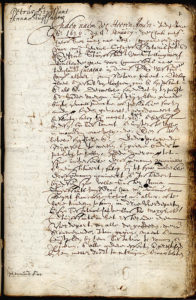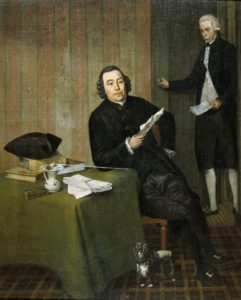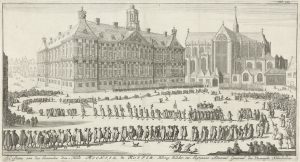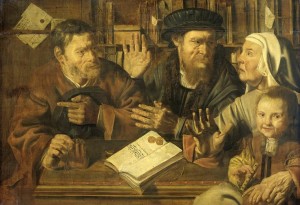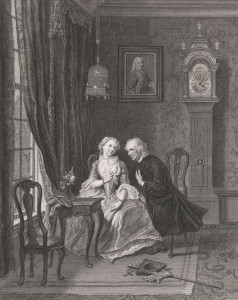In some cases, couples made a prenuptial agreement when they married. Often, this was the case when at least one of the spouses had assets to protect, or when one of the spouses was richer than the other. The typical arrangement was that if one of them died without children, that person would receive a sum of money while the survivor kept the rest. The sum reflected each spouse's financial situation at the start of the marriage. Another reason to make a prenuptial agreement is if one or both of … [Read more...]
Dutch term – Veiling
A veiling is an auction. You can sometimes find announcements of auctions in the paper, for example if a family is about to emigrate and is auctioning off their household items they won't take with them. Such an auction would be called a boelgoed in Friesland. Sometimes, notarial or voluntary court records were created to record the conditions and results of the auction. These can give you great insights into the lives of your ancestor since it shows you what items they owned. Auctions … [Read more...]
Dutch term – Notaris
A notaris is a notary. In many parts of the Netherlands, notaries were the record creators for many aspects of our ancestors' lives, for example when they wanted to draw up a prenuptial agreement, a contract to sell property, a work contract, or a will. See the article about notarial records for more information. … [Read more...]
Quick Tip – Life events may create notarial records
Many notarial records are unindexed and can be time-consuming to go through. But notarial records were often created because of a life event that we can find in other sources. In a small town with just one or two notaries, it can pay off to browse the notarial records around that time. In towns without a notary, these types of records can be found in the series of voluntary court records. Examples of life events that may have created notarial records: Marriages: prenuptual agreements, … [Read more...]
Quick Tip – Dutch Ancestors Left Few Last Wills
Our Dutch ancestors rarely had a last will drawn up. Most were too poor to have any goods to leave behind. But even people who did own property often did not feel the need to have a last will, since they were happy with the default arrangement under the law. The wills that do exist can be found in notarial records (in areas and periods where notaries were available) or voluntary court records. … [Read more...]
Quick tip – Use notarial records
Notarial records are a great source of genealogical information. They can contain prenuptial agreements, business contracts, last wills, and estate divisions, giving you an insight into your anecstors' lives and family. Not all areas had notaries before 1811, in which case you can find these sources in local court records. A growing number of notarial and court records are available online, so if you haven't yet used these records, search again. Read more about Notarial Records. … [Read more...]
Quick tip – Inventories are Usually for Both Spouses
If you find an estate inventory of a deceased married person, beware that the property in the inventory is usually for the couple, not just the property that belonged to the deceased spouse. If there was no prenuptial agreement, the husband and wife jointly owned all their property. The inventory would usually appraise all the property, of which the deceased's share would be half. That half would be divided among the heirs of the deceased, such as his or her children or (in the absence … [Read more...]
Source – Notarial records
Notarial records are created by a public notary and serve as legal proof of the information contained in the record. Information in notarial records Examples of the types of records you can find in notarial archives are: Real estate transactions (sales, conveyance) Debts Obligations Auctions Prenuptial agreements Last wills Estate divisions Work contracts Replacement contracts for enlisted men Powers of attorney A notary created copies of most of the records … [Read more...]
Quick tip: Did your widowed ancestor make a settlement?
If a widow or widower with young children wanted to marry again, often they first had to make a settlement with their minor children so they received their share of the deceased parent's inheritance. These records can be helpful to prove family relationships, to get insights into the economic circumstances of the family, and to find out about subsequent marriages. These settlements can be found in orphan chamber records, voluntary court records, or notarial records, depending on the time and … [Read more...]
Dutch term – Huwelijkse voorwaarden
Huwelijkse voorwaarden (literally: marriage terms) is the Dutch term for prenuptial agreement. Historically, like today, most people did not have huwelijkse voorwaarden. Prenuptial agreements were often made by people who were well-to-do or who had children from a previous marriage to provide for. A prenuptial agreement identifies the spouses, sometimes accompanied by family members, and describes how the estate should be divided in case one of them dies. Usually, different scenarios are … [Read more...]
